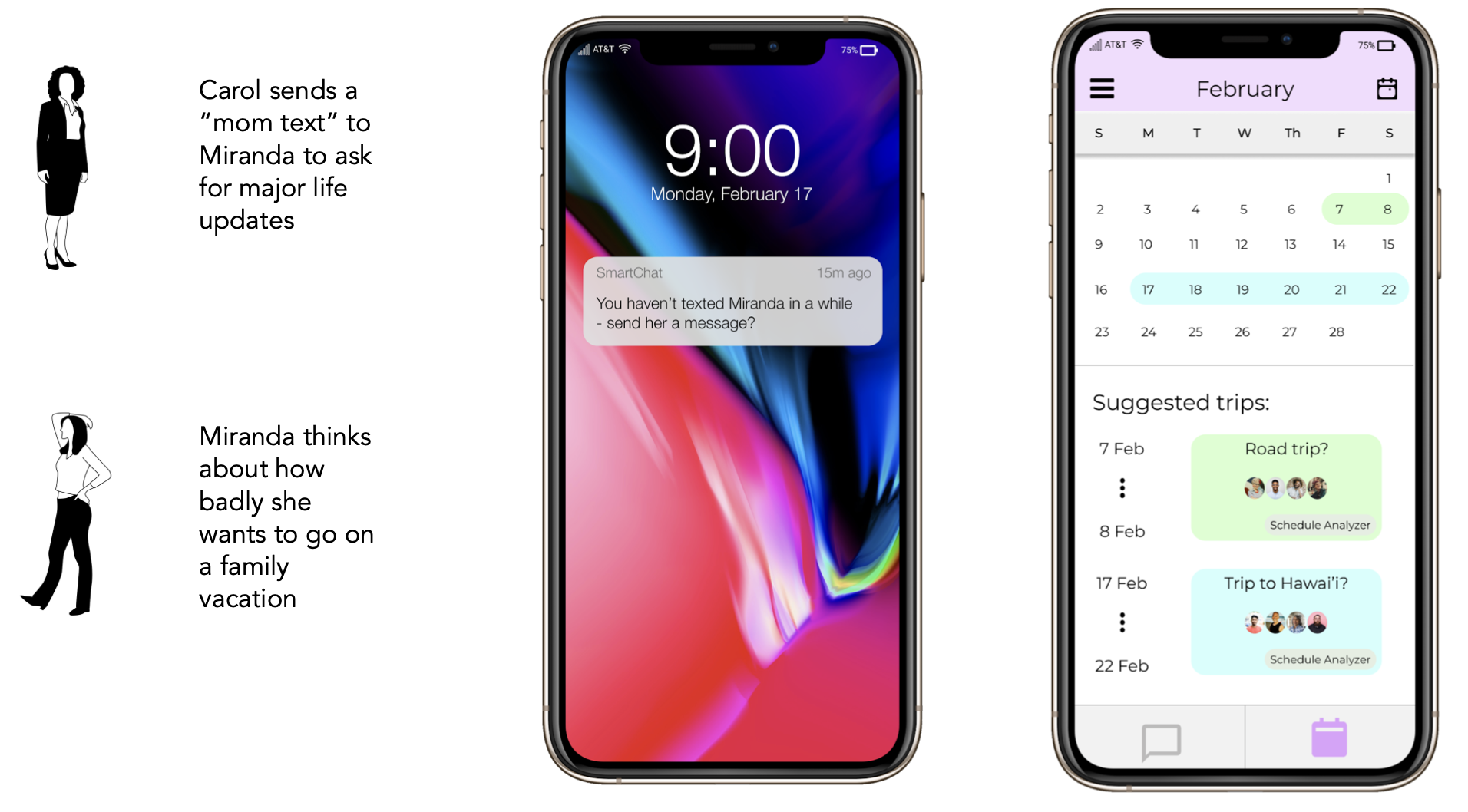SMARTCHAT
A phone application to bring the long-distance family closer.
Overview
Course: Problem Framing; Project Completed in a Team of 2
Focus: Storytelling; Research; Ideation; Prototyping; UI/UX Design; Testing
Timeline: January 2020-February 2020
How Are College Students Communicating with their Families?
Meet Carol and Miranda, a mother-daughter pair. Miranda has recently left for college. Before Miranda left for college, she and her mother used to do everything together. They would discuss their plans for the day, bond during car rides, and always be kept up to date on each other’s lives. They were satisfied with their relationship, and happy with the ways in which they communicated with each other.
Unfortunately, this is not the case now that Miranda has left for college. Carol and Miranda are constantly wondering what each other’s schedules look like, playing phone tag, and missing each other. They are not effectively communicating with each other, and miss how their relationship was before Miranda left for college.
How might we improve communication and relationship satisfaction between college students and their distant families?
Interviews and Diary Logs
To begin tackling this question, we interviewed 5 families, talking to college students, parents, and siblings separately. We also sent out a diary log to students and parents, asking them to document all of the times that they thought about their family (when, why, did they reach out) over the course of 3 days.
We organized our collected data around the following research questions:
How are families communicating? How frequently are families communicating? Why are family members communicating with each other? How do family members feel about their relationships with each other? How much do family members think they know about each other?
Analysis
We plotted the families that we spoke with on a 2x2 to compare their communication and relationship.
We identified 2 groups that families fell into, and used those groupings to create typologies: the “Star Communicators” and the “Improvement Seekers.” Star Communicators are communicating well with each other, and are happy with their relationship. Improvement seekers feel like there are aspects of their relationship that have room for improvement, and feel as though they were not sharing enough information with each other all the time.
We chose to focus our efforts on the “Improvement Seekers,” and created a rough journey map of the families within that typology to discover their pain points before and after college.
After tracking the pain points of the “Improvement Seekers,” we noticed a lot of the families experienced similar pain points. These pain points drove our ideation.
Ideation
We ideated around our common pain points and came up with over 50 different ideas for how to improve communication between college students and their parents.
We evaluated our ideas on their desirability, feasibility, and uniqueness. We then clustered our high impact, low effort ideas around the pain points that they directly addressed.
Prototyping and Testing
We created wireframes for the ideas that we felt were the most effective. Our App, SmartChat, has 2 parts.
The first part is a “group chat,” that integrates family members’ social media posts, family inside jokes, and desirable features from other messaging apps (such as channels, direct replies, and pinning messages).
The second part is a “calendar,” that acts with individual’s personal calendars to find times when family members are free to schedule a communication. It also allows family members to interact with others’ calendars to schedule messages and reminders around other’s events.
User Testing Round 1:
We used our wireframes to test major adaptation assumptions with the families we originally interviewed.
The feedback was overwhelmingly positive, and our hypotheses were confirmed with families within the “Improvement Seekers” and “Star Communicators” groups, as well as outside families. We identified functionalities that people were most excited to use, and features that might be considered “premium” in an app on the market.
User Testing Round 2:
After our initial tests, we created updated wireframes and a prototype of the application on figma.
We did a second round of user testing on this prototype, focusing on physical interactions with the app, visual language, and accessibility.


























